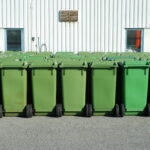Pallets are used by many businesses to hold boxes of products and can be easily handled by a forklift, pallet jack, front loader or other jacking device. Goods or shipping containers are often shipped on a pallet secured with strapping or stretch wrap. Pallets are made from wood, plastic, paper, or metal and come in a wide variety of sizes, and can be…
Next to paper, bottles and cans are the most commonly recycled materials in the United States. This category represents all glass, plastic and metal/aluminum containers. Recycling these items: Saves natural resources from being mined and harvested Reduces the pollution created when extracting, processing, and shipping the raw materials Can save your business money on disposal…
Electronic equipment discards such as computers, televisions, audio/visual equipment, phones and office equipment is one of the fastest growing segments of our waste stream. Generally known as “e-waste”, it requires special attention for proper disposal. In good condition, electronics can be refurbished and resold, or donated for reuse. Why should you recycle your electronics? Two sets…
Why should you recycle Construction & Demolition (C&D) Materials? The Massachusetts Department of Environmental Protection (MassDEP) has implemented waste disposal bans on many of the materials generated during construction and demolition including: Asphalt Pavement, Brick and Concrete (ABC), Wood, Metal and Clean Gypsum Wallboard. RecyclingWorks, using stakeholder input, has developed a set of Best Management…
Our team recently had the opportunity to take a tour of the Springfield Materials Recycling Facility (MRF) to see how these facilities separate the many materials in a recycling bin. The Springfield MRF, owned by the Massachusetts Department of Environmental Protection and operated by Waste Management Recycle America, has been sorting and selling the recyclables…
In an article that appears in Green Lodging News, Dan Reuben discusses innovations in the hotel industry since he co-founded Boston Green Tourism in 2005. Hotels have the potential to use large amounts of energy and water, and produce a large quantity of waste. In the article, Reuben writes that the hotel industry has improved…
As restaurants, bars, hotels, and other businesses have closed or adjusted their operations due to COVID-19, breweries have been faced with excess inventory that cannot be sold. The Massachusetts Brewers Guild recently shared how breweries can partner with organics processors, such as Vanguard Renewables’ farm-based digesters, to divert the liquid from disposal, turning it into…
Since 2014, when the Massachusetts Department of Environmental Protection (MassDEP) enacted the Commercial Food Material Disposal Ban, businesses and institutions across the state have increasingly started diverting food waste. While food waste diversion leads to significant environmental benefits, it also has potential to provide cost savings for businesses, and opens up opportunities to address customer…
Starting November 1, 2022, mattresses will be banned from disposal in Massachusetts. These bulky items, once taking up space in landfills and disrupting operations at municipal waste combustion facilities, will be redirected to recycling facilities and downstream markets for their metal, foam, fabric, and wooden components. Each of the elements that make up a mattress…
A recent WasteDive article describes how Waste Management’s Centralized Organic Recycling (CORe) facility in Boston is diverting food waste from landfills and preparing it for use as a clean energy source. The compact CORe system provides another outlet for businesses and institutions located in densely populated areas that cannot easily support a large composting facility. Currently,…

